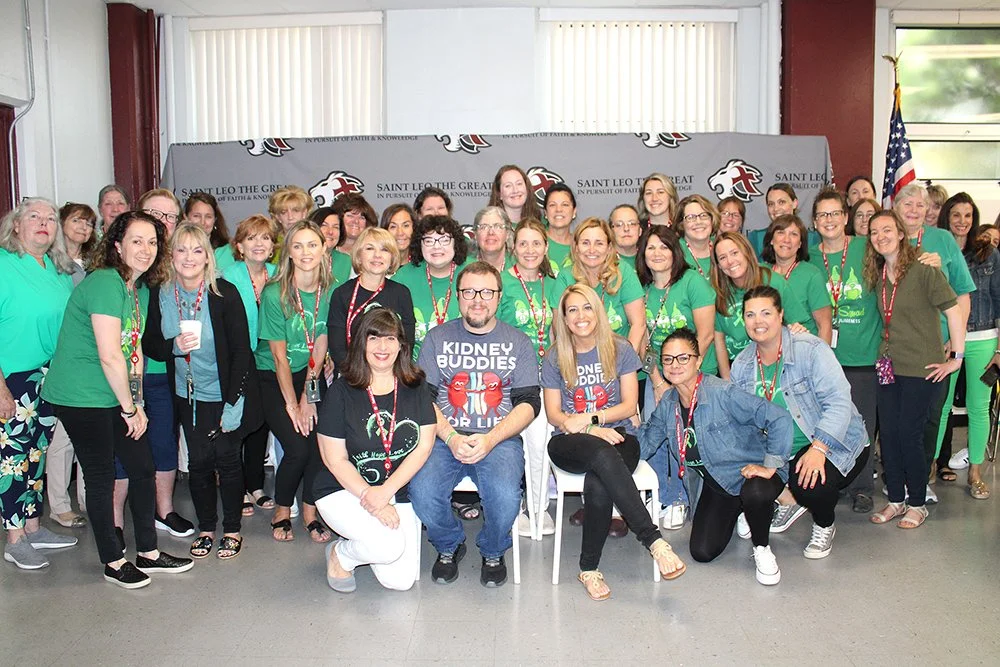“I decided to join the RKDF team to learn more and to spread the word. I am so proud to help RKDF and be involved with one of the leading edges of medicine today. I hope to be a research study patient for ADTKD.”
A Story of Three Sisters, By Sally Harrison
Currently, there is no cure or treatment for MUC1. Failing kidneys lead to dialysis and then to transplant. At the Autosomal Dominant Tubulointerstitial Kidney Disease (ADTKD) Family Day in Winston Salem in September, a TED talk by Dr. Anna Greka presented the advances that are being made at the Broad Institute in Cambridge, Massachusetts, a research organization of MIT and Harvard. With the advances being made, transplant as the only solution to kidney failure may change sooner rather than later.
Richard R. Nelson, Chair & Co-founder Rare Kidney Disease Foundation
My Family’s Experience with MUC-1, by Carla (Charley) White
I am very grateful to Dr. Anthony Bleyer and his team at Wake Forest School of Medicine who also partner with the medical staff at MIT's Broad Institute for their dedication and hard work in isolating this gene. We now have answers to this baffling disease, which provides hope to all of us who are affected by these rare kidney diseases.
Two Teachers Now United for Life, by Elizabeth Wulfhorst
My Experience with MUC1 - by Christine Hernandez
Three Generations…One Genetic Mutation….Hope on the Horizon, by the Agostino Family
After finding the Rare Kidney Disease Foundation and Dr. Anthony Bleyer at Wake Forest School of Medicine we were so grateful and are feeling positive about future treatments. We never want another family to suffer as so many have, including our family… Dr. Bleyer and his team were a lifeline we needed so badly and we are eternally grateful for all of the efforts they have taken on to help families like ours.
My Family’s Experience with Genetic Kidney Disease
Ed Ozier's Story
“Since Ed’s father had kidney disease, he started researching his family’s genealogy. He found links in every generation that he researched, showing nearly one hundred years of his family with kidney disease....
With the genetic testing with the Broad Institute he has finally found out the name of the family kidney issues. It is ADTKD—UMOD.”
My ADTKD Story - Sheri Dafoe
“When visiting physicians, I was always asked, “What’s the name of your disease?” I would reply with, “there isn’t one. It’s being researched.” Several years ago, we began correspondence and met with Dr. Anthony Bleyer. We learned from him that our kidney failure was genetic, and we now had a name for it, Autosomal dominant tubulointerstitial kidney disease (ADTKD) with the Muc-1 mutation.”
My Story - Susan McKenzie
“We finally knew what we were dealing with. Others in my family could now get tested; they could be tested earlier rather than waiting for kidney decline, and if positive for the gene, they could be proactive about their disease progression; family members who now knew they didn’t have the gene could be considered as potential living donors to other family members. So, with that concrete diagnosis came indescribable hope.”
I solved the mystery of why my kidneys failed - Sue Reale
“Fortunately, a transplanted kidney (like I have) is NOT affected! I found and joined the RKDF (Rare Kidney Disease Foundation) after doing a Facebook search. I know now that there is hope for future generations due to scientific advances in research, free gene testing, and a cure/therapy that is in the works!”
How I Got To Here - Suzanne Kelly
“Through Dr Bleyer and his team’s work I have hope for my family. Attending the family meetings, learning about others who have had many years and many family members living with ADTKD, meeting the people who research and communicate on this disease, seeing the formation of RKDF—all have been ongoing lessons in a world I didn’t know existed”
My UKD Experience - Kathryn Stankus
My Kidney Story, by William Reiff
A multi generational illness - Stephen Hayton
My Kidney Disease Journey - Jennifer Mayer O’Keefe
“Based on our family history and the presentation(increasing creatinine and a bland urinalysis with normal kidney scans) my niece was referred to Dr. Bleyer and was tested for a newly discovered genetic disorder that affects kidneys called Autosomal Dominant Tubulo-interstitial Kidney Disease. First she was tested for the UMOD variant. When it came back negative they tested her for the Mucin 1 type and just like that, the mystery of our family history of CKD that spanned over multiple generations was solved.”



